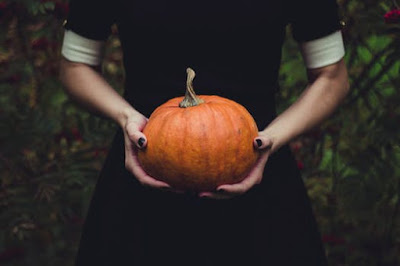Last week we brought home pumpkins and
carved them with the kids. Now, a week later, they are rotten, and
I have to throw them away. I thought they would last longer than they
did in our former, rainy climate, but I
guess hollowed-out pumpkins don't do all that well in 80-degree
weather. And I guess that next year, we'll be painting them instead.
I did look surreptitiously at my
neighbor's porches to see if any of them had carved pumpkins, too. At
first I assumed their absence was because this is an Adventist town,
and we're all too pious here, but now I wonder if it's just that they
knew better than I did.
It's Halloween time, and Halloween is a delicate topic in Christian communities. We all relate to it in different ways. I have lived in places where the church celebrated by bringing out the cautionary pamphlets, and refused to have a church social in October, lest someone get the wrong idea. I've gone to harvest parties, and I even remember, as a kid, being sent out to gather canned foods for Community Services on Halloween night (we usually got as much candy as canned goods). Of course, for the last many years, I've been able to avoid the issue altogether by getting completely exhausted with Reformation Day events.
I liked the holiday as a kid. I usually made my own costume, like the year I sewed fabric cat ears (made out of shoulder pads) to a headband and wore black. Or when I borrowed a tacky bathrobe and slippers, and put my hair in rollers. One year some friends and I went out trick-or-treating, and one had elf-ears on, and got constantly asked if she was Ross Perot.
But I have to admit that Halloween has changed since I was a kid. I don't remember lawns strewn with bloody body parts, or black-cloaked figures on porches that move when you tripped their motion sensors. The scary has gotten scarier, as the holiday-decor sales numbers attest. In fact, you don't get off the hook by not celebrating Halloween. When my kids see it on lawns, or in stores wherever we go, I have to deal with it.
And this is my real beef with Halloween. As a good Adventist, I teach my kids about the state of the dead--that death is like a dreamless sleep. And I ought, by that virtue, to be free from dealing with bedtime fears of ghosts and zombies. My kids should believe there's nothing scary in the dark, and go to sleep when they're supposed to.
Instead, I have to explain. I have to tell them this is pretend. People made this up, and they put out all these decorations for fun. Why is it fun? I don't really know.
I have some theories, though--theories I don't try to explain to four-year-olds. Perhaps all of this pretend darkness is fun, because it can be controlled. Because there is real darkness out there, real horror, and real evil, and it doesn't go away when it's time to change to Christmas decor.
And that's the reason why I don't bother having a strong opinion about Halloween. It's because there are real scary things in the world to worry about instead. As Christians, we know it better than anyone else.
The face of my own mortality is terrible enough. But then there are abuse, and oppression. There are the nasty things that people really do to one another, both in body and in spirit. Because there are parents out there who can't give their children enough to eat, and children growing up believing they must be bad because of what someone else did to them. Because men and women are wrestling right now with the cold sweat of addiction, or trying to survive in a culture that will never acknowledge them.
Because the evil isn't always on the outside, knocking to get in. And because we all suffer from sin, even before we're old enough to commit it.
Christians know what actual darkness is, and we know the source of the light, too. Kids in costumes don't count, and stage blood isn't enough to blip on the radar. We have no need to be afraid of witches or werewolves. The kind of evil that's made up, or at worst, imitation, isn't really the problem. Paul tells us we have bigger things to fight.*
So I don't have any judgment to offer on what you do on Halloween. You can go to a harvest party, or meet the neighbors with hot cider out on your lawn. You can stay indoors and keep your lights off. It won't really matter, if you're about the real business of the faith. What makes us Christians isn't what we say about the play darkness, but what we do about the real.
You and I are called to look the real darkness of the world in the eye, and bring the light to it. And this is all that really matters.
As for me, I plan to try again with the pumpkins, but I'll wait until next autumn, because I'm cheap. This year, my ten-year-old wants to go trick-or-treating with a friend. I got out her Reformation Day costume, and she's going as (Bloody) Mary Tudor. I think that ought to be terrifying enough.
*Ephesians 6:12






